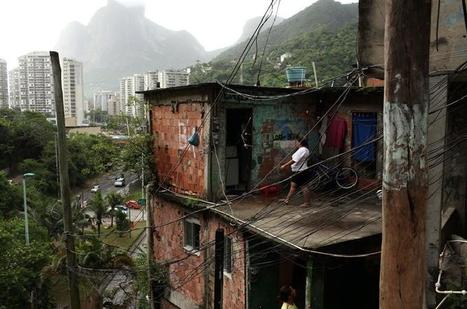"I often ask students and audiences a quirky question: "What is the capital of Latin America?" Of course, it is a region of a couple dozen sovereign countries and the colonies of several empires, so there is no real capital. But if there were, I assert, it would be MIA: Miami International Airport. Specifically, the American Airlines hub at MIA is the nexus of most of the hemisphere, as illustrated in this 2002 route map."
Get Started for FREE
Sign up with Facebook Sign up with X
I don't have a Facebook or a X account
 Your new post is loading... Your new post is loading...
 Your new post is loading... Your new post is loading...

Stacey Jackson's curator insight,
February 22, 2013 1:46 AM
All this to host some games? I'm not a fan of the World Cup or the Olympics, not only because I do not follow any sports, but also because it seems the planning of these events gets out of control and more harm is caused than good. Of course, that is just my opinion, but the fact that a country like Brazil, with one of the world's top economies, doesn't provide proper housing for its poorest citizens seems unfair. Furthermore, that they are willing to "spend billions of dollars in the name of creating a playground for international tourism and multi-national sponsors" while wiping out poor neighborhoods in the process is disgusting. If Brazil is embarrassed by their Favelas, they should be constructing appropriate housing for the population instead of displacing people and bulldozing their neighborhoods. I can't imagine a large homeless population will be any more pleasant for the tourists to see than favelas.
chris tobin's comment,
February 28, 2013 7:29 PM
The favelas are an area that the rich would like to see gone....How can the world keep allowing such activity
|

Stacey Jackson's curator insight,
February 22, 2013 12:35 AM
The fact that one resident featured in the video said she has "nothing to complain about" says a lot about the housing situation in Caracas. She didn't seem to think she deserved to live in a better environment- instead she accepts the unfinished skyscraper with rudimentary services and no sewage removal. It is a shame that Caracas hasn't been able to meet the housing demands of their growing population. I'm sure the issue is more complex, but it seems like this oil-rich nation should be able to build proper housing for its citizens. Also, 2,500 squatters is an astounding figure. Just to put it into perspective, my neighborhood (in Providence) has a total population of 2,669. I can't imagine all of us being crammed into one building without electricity, air conditioning, or proper plumbing.

Lauren Stahowiak's curator insight,
February 11, 2014 12:23 PM
Squatters occupy a building that was constructed to symbolize great wealth in Venezuela including a landing pad on the roof and floors to occupy office buildings. Due to a financial crisis, the building was never finished and squatters have taken advantage of this empty building. There is no windows, plumbing or an elevator to reach the higher levels of this skyscraper. Because of this, many safety issues have risen, including deaths. There is no other place for these squatters to live, it has become their home and they are temporarily making the best of it. |
















Miami being the "capital of Latin America", is something that I never, at all would have ever thought of, because, well, it isn't really in Latin America. But, seeing this chart of the MIA really makes me think, and Miami being the "capital" now makes a lot of sense. There are so many more flights from MIA connecting to places in Latin America than to other parts of the US, and even other parts of the world. It's a little crazy to think that this airport is the "hub" of Latin America.